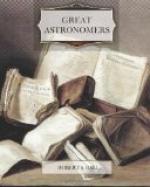We have already mentioned that, in 1826, Brinkley was appointed Bishop of Cloyne, and the professorship of astronomy thereupon became vacant. Such was Hamilton’s conspicuous eminence that, notwithstanding he was still an undergraduate, and had only just completed his twenty-first year, he was immediately thought of as a suitable successor to the chair. Indeed, so remarkable were his talents in almost every direction that had the vacancy been in the professorship of classics or of mathematics, of English literature or of metaphysics, of modern or of Oriental languages, it seems difficult to suppose that he would not have occurred to every one as a possible successor. The chief ground, however, on which the friends of Hamilton urged his appointment was the earnest of original power which he had already shown in a research on the theory of Systems of Rays. This profound work created a new branch of optics, and led a few years later to a superb discovery, by which the fame of its author became world-wide.
At first Hamilton thought it would be presumption for him to apply for so exalted a position; he accordingly retired to the country, and resumed his studies for his degree. Other eminent candidates came forward, among them some from Cambridge, and a few of the Fellows from Trinity College, Dublin, also sent in their claims. It was not until Hamilton received an urgent letter from his tutor Boyton, in which he was assured of the favourable disposition of the Board towards his candidature, that he consented to come forward, and on June 16th, 1827, he was unanimously chosen to succeed the Bishop of Cloyne as Professor of Astronomy in the University. The appointment met with almost universal approval. It should, however, be noted that Brinkley, whom Hamilton succeeded, did not concur in the general sentiment. No one could have formed a higher opinion than he had done of Hamilton’s transcendent powers; indeed, it was on that very ground that he seemed to view the appointment with disapprobation. He considered that it would have been wiser for Hamilton to have obtained a Fellowship, in which capacity he would have been able to exercise a greater freedom in his choice of intellectual pursuits. The bishop seems to have thought, and not without reason, that Hamilton’s genius would rather recoil from much of the routine work of an astronomical establishment. Now that Hamilton’s whole life is before us, it is easy to see that the bishop was entirely wrong. It is quite true that Hamilton never became a skilled astronomical observer; but the seclusion of the observatory was eminently favourable to those gigantic labours to which his life was devoted, and which have shed so much lustre, not only on Hamilton himself, but also on his University and his country.




